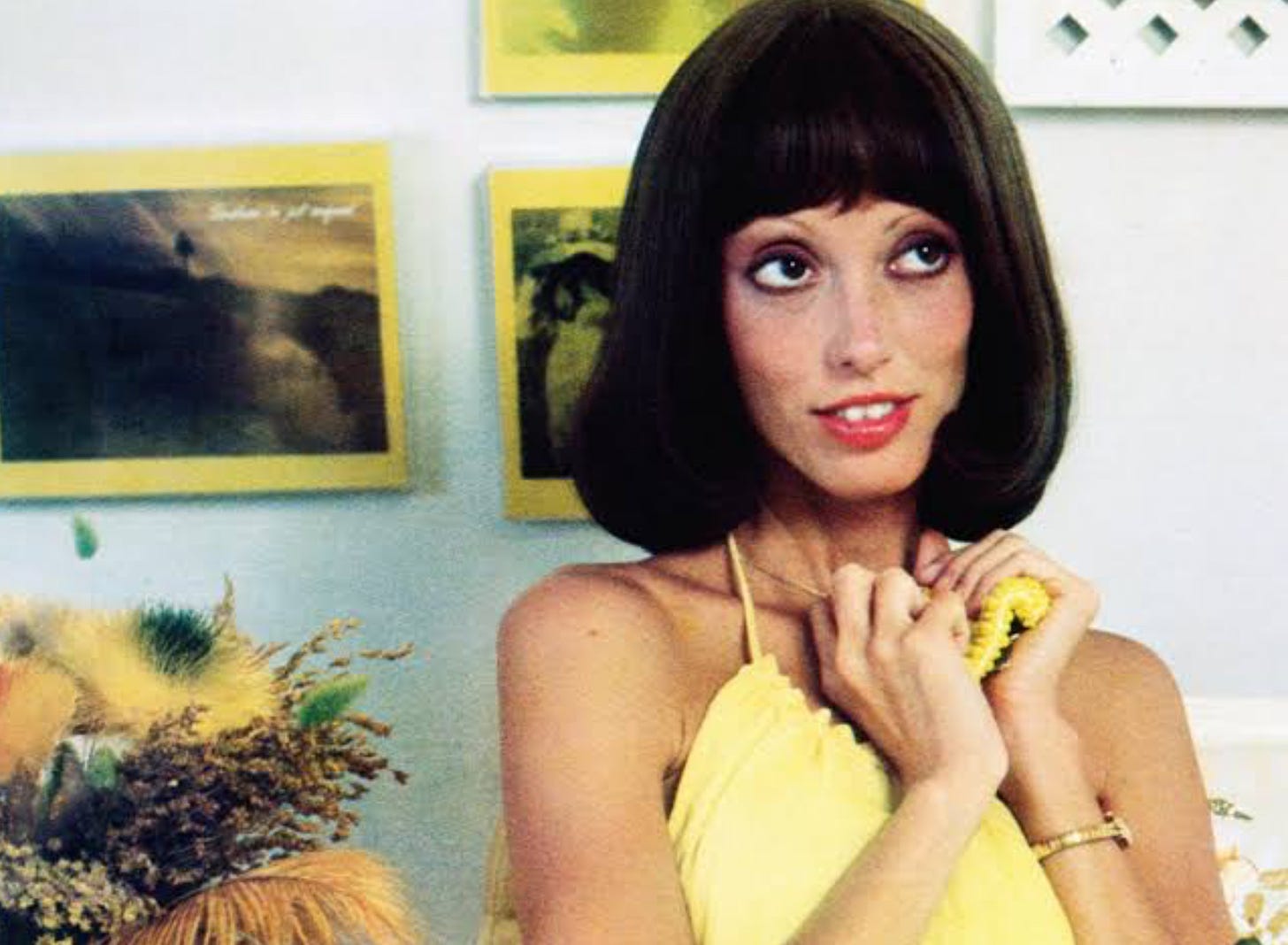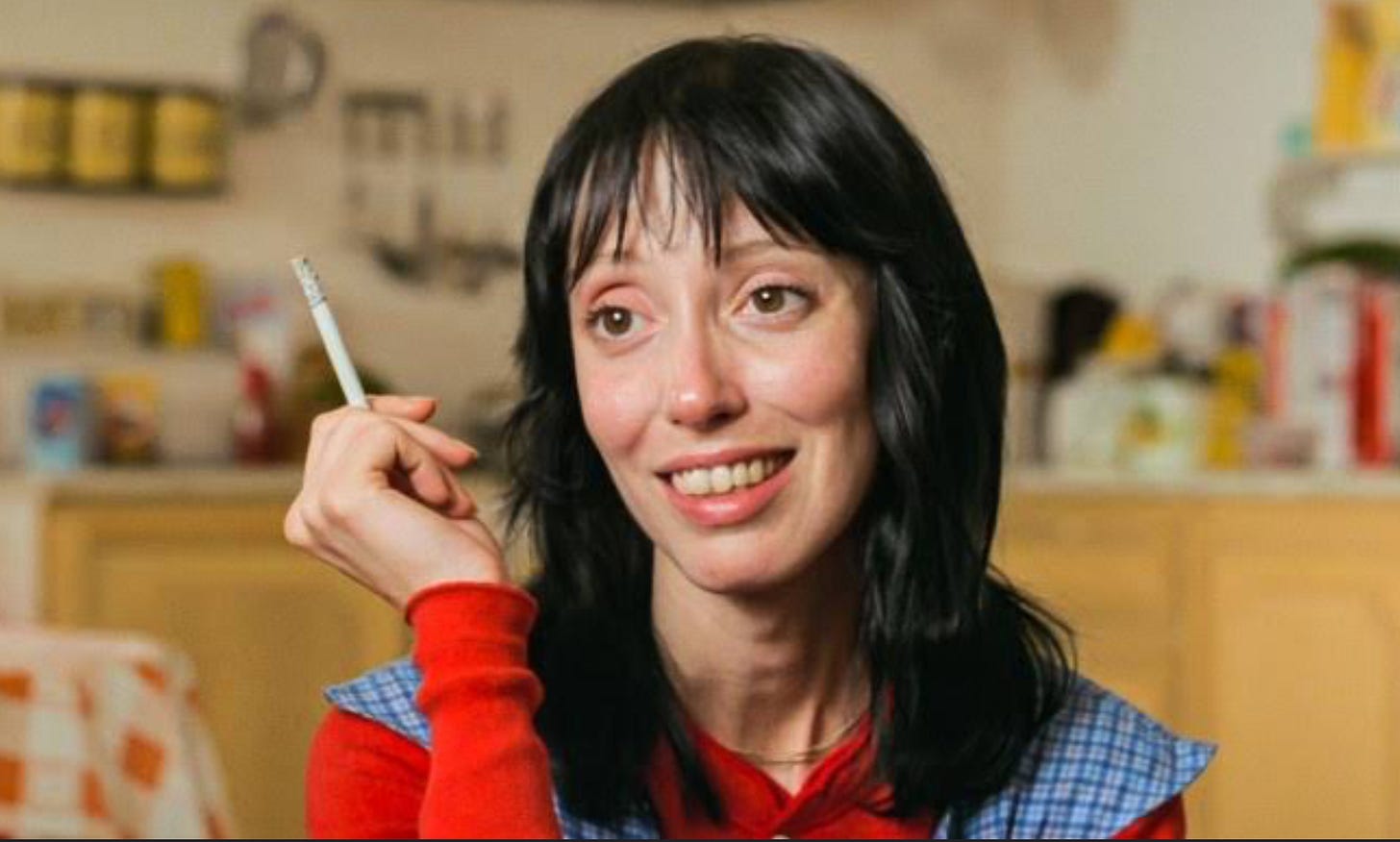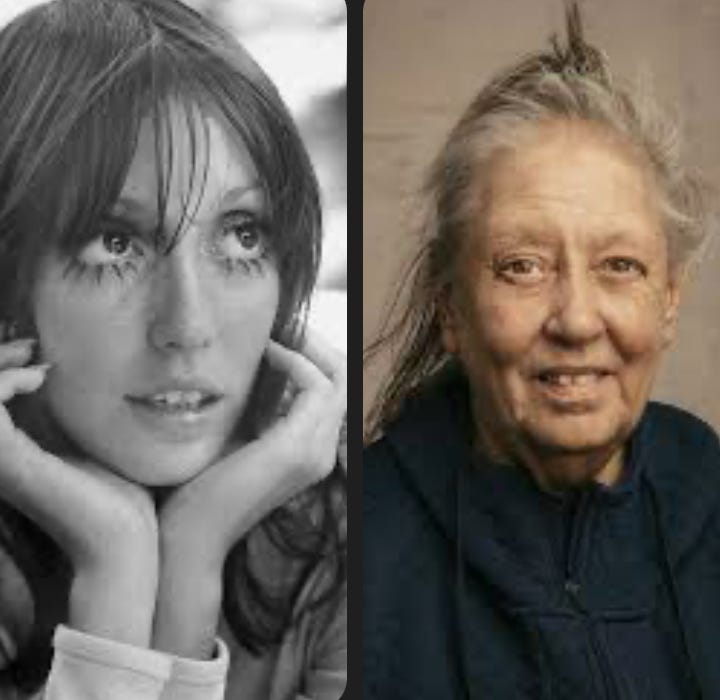R.I.P. Shelley Duvall
A eulogy for the reclusive acting great. Star of The Shining and Popeye. One of the great muses for Robert Altman, and one of the great actors of the 1970s. R.I.P.
Shelley Duvall has died. She was 75. First reports, with comment from her partner of over 30 years, say she died in her sleep due to complications associated with diabetes.
Duvall is best known for the 1980 twin peaks of The Shining and Popeye. One a horror classic, one a comedy-musical disaster. But Duvall absolutely shines in both. She first appeared on screen a decade prior, cast in Robert Altman’s Brewster McCloud. From there she would be a feature of most of his films for a time, appearing in 1971’s McCabe & Mrs Miller, 1974’s Thieves Like Us and 1975’s Nashville.
And then, in 1977, a year arguably more impressive than her twin leads of 1980, she appears in Woody Allen’s Annie Hall and Altman’s 3 Women. It’s her role in 3 Women that really matters. She is devastatingly good. Indeed, her win at Cannes is what set her up for the role in The Shining.
And let’s talk about that. It’s a movie borne of male egos. You have a book by Stephen King, he’s the hot new name in horror and there’s a rush for name directors and studios to take his books and turn them into films following the success of Carrie. Then you have Stanley Kubrick, his perfection legendary. Most everyone praises Jack Nicholson for his carrying of this film, and several others — and of course he is wonderful, here and elsewhere. But the heart of the movie version of The Shining sits with Shelley Duvall’s extraordinary, gruelling performance. She had an unhappy time on the set, during a long shoot. It’s well documented that she was all but bullied by Kubrick. The was a level of emotional torment that she endured, and then translated to the screen. She is also one of horror cinema’s early — and largely unheralded — “final girls”. The same year that Friday The 13th circled around Halloween’s earlier effort. The Shining explores the strength of women, particularly women as mothers, and that bond and commitment, in a way that wasn’t being looked at in horror at that time. Duvall’s performance in the film is the subtly compelling secret sauce.
The other movie she made in 1980 had huge expectation around it - Altman directing, Robin Williams hamming and mugging, Harry Nilsson composing — again the male egos. And it’s Duvall’s performance that is the winning note. She was “born to play Olive” according to more than one critic, she also has the very best musical moment in the movie:
By 1990, Duvall had started to move away from Hollywood. Her filmography shows plenty of 90s activity, and she was often a winning cameo (Roxanne, 1987; The Portrait of a Lady, 1996; Home Fries, 1998) but her most impressive work across the late 1980s, and into the 1990s, pioneering in fact, was her commitment to children’s television.
She started producing television for kids in the 1980s, and created and hosted the programmes Faerie Tale Theatre (1982-1987), and then Tall Tales & Legends (1985-1987) and Nightmare Classics (1989), finally Shelley Duvall’s Bedtime Stories (1992-1994).
By 2002, she had retired from acting, and largely from a public life. She wrestled with both her mental and physical health, and various issues. And was, unkindly, the subject of several “Where Is She Now”-type stories, in both print media, and then online; most cruelly about a decade ago when people started to realise what a complete cunt Dr Phil was, with his exploitation of her mental health purely for television eyeballs.
Last year she returned to acting for werewolf slasher, The Forrest Hills. I’ve yet to see that film, but it’s great to know she had a swan song (appearing alongside Dee Wallace, a similar screen presence from a similar time, and many legendary films, including several horror staples).
But Shelley Duvall is so much more than a footnote, or one role. She was a multiple award winner, and able to show a huge range when you line up Nashville, 3 Women, The Shining, Popeye and Roxanne as just some of her very best work.
She was a huge acting presence in my life, from the time I was taken to Popeye as a kid — and I loved it, because I was a kid! And it was a movie! It was years later that I’d find out about the film’s complicated reputation. And then, as a teenager, she was a huge part of my world again when I discovered The Shining.
And from that nervous, terrified first watch, now on through to multiple rewatches, I am always cheering for her character. And I’m always amazed at the sequences where she is never less than completely human. So many horror films really struggle around showing the lead characters breaking down. Somehow they’re able to see their family members and friends savagely killed, and as an act of strength they just carry on. We get the pantomiming of self-preservation, though a ludicrous notion.
But in the ‘Wendy’ that Duvall presented, we feel the anguish of a broken, confused woman. She is absolutely determined to protect herself and her son, but she is confused, heartbroken, alone in isolation, and utterly terrified. She doesn’t just run through rooms and suddenly have skills we never figured were possible. That’s not her resilience. She is slow and fraught, and baffled, and her every movement is a reaction to abject horror; framed by the streak of tears and the deterioration of her appearance as physical manifestation of the horror that is happening to her, at her, all around her. That is her resilience.
It is a most shining performance.
And she was so utterly a star.
R.I.P. Shelley Duvall







:( a beautiful eulogy, for a very unsung talent. Thank you.
Stunning words and commentary as always, Simon